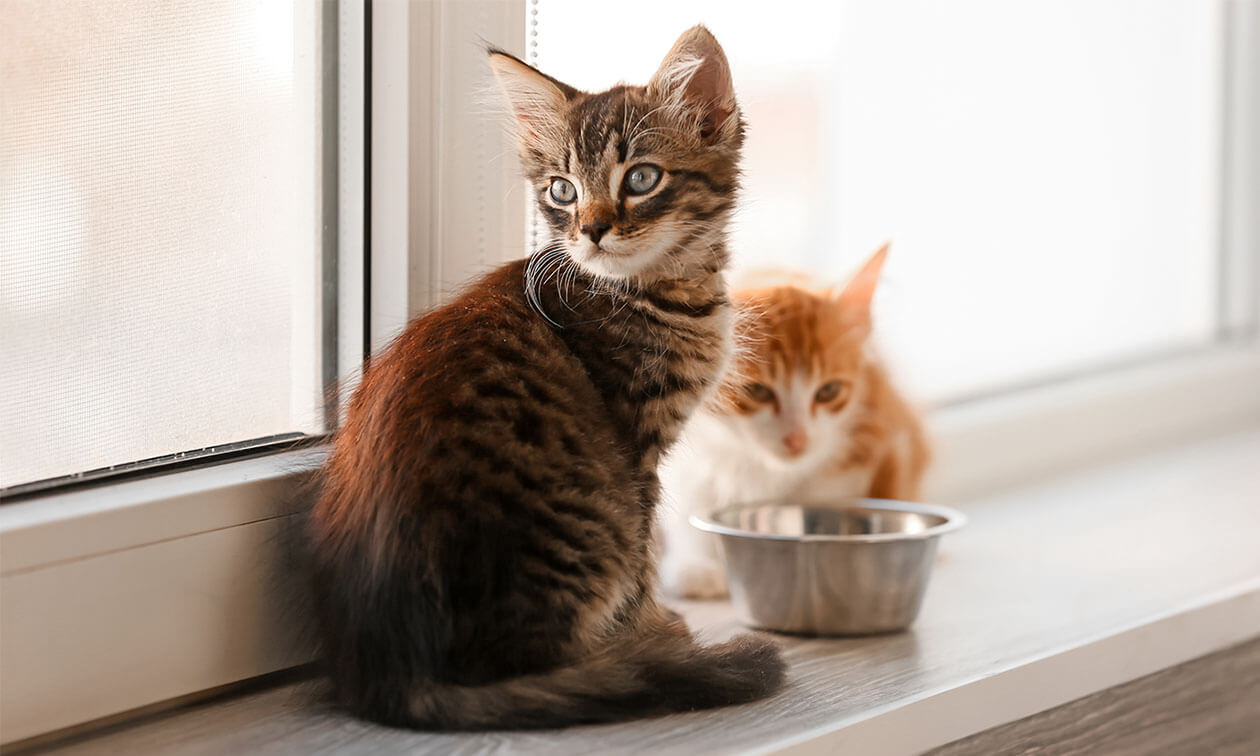Watching your kitten grow is one of the joys of being a cat parent. They change and develop fast (often right before your eyes)! Understanding their key milestones can help you give them the best start in life and make sure they grow into healthy, happy adult cats. Whether you're caring for newborns or bringing home a recently adopted kitten, here's a helpful guide to answer your most common questions.
When Do Kittens Open Their Eyes?
Kittens are born with their eyes closed. Around 1 to 2 weeks of age, their eyes start to slowly open. By 3 weeks old, most kittens will have both eyes fully open.
When Do Kittens Start Walking?
Kittens start crawling at two weeks. By four weeks, they are standing and then walking. Playing with their littermates comes next!
When Do Kittens Start Eating Food and Drinking Water?
Weaning kittens off their mom’s milk begins around three to four weeks of age. Weaning should occur once kittens begin showing interest in solid food.
Kittens can start eating kitten food moistened with water within four to six weeks of age, while still nursing. From five to seven weeks, gradually introduce more dry food and decrease milk or formula. By week nine, kittens should rely on kitten food and water.
When Should Kittens Be Potty Trained?
Four weeks of age is a good time to start litter training. A very low-sided box with paper litter or non-clumping litter is best in case the kitten tries to eat it. Show the kitten the litter box immediately after they finish eating.
Young kittens need to be stimulated to pee and poop, which is something their mother does. Once this stimulation is no longer needed, most kittens instinctively look for a place to dig and bury. They’re likely to find and use the litter box on their own. They’ll also see mom using the box and follow her example.
When Do Kittens Get Their First Vaccines?
Kittens can start their vaccines at about six to eight weeks of age and will continue them every three to four weeks until they are 16 to 20 weeks old depending on type of the vaccine.
When Do Kittens Get Teeth and Start Teething?
Baby teeth start appearing at two to three weeks of age and are all present by eight weeks. These baby teeth start to fall out at about three months until all the adult teeth are in at about six months. During this period, the kitten may have signs of teething like excessive chewing, temporary red gums, or pawing at their mouth.
When Should Kittens Be Socialized?
The first couple of months are the best time to begin kitten socialization, as that is when they’re most open to new experiences. This type of socialization includes other pets, people, sounds handling, and new objects in their environment. New experiences should be positive and fun; if your kitten fears a new situation, don’t force them into it.
When Can You Deworm a Kitten?
A deworming schedule will be determined by your kitten’s veterinarian, but may start at their first vet visit. Ask your veterinarian if your cat needs routine deworming.
When Can Kittens Eat Adult Cat Food?
Most cats are ready to switch from kitten food to an adult diet around their 1st birthday. However, large breeds of cats grow for a longer period and will be ready to switch at about 18th months of age. These breeds include Maine Coon, Ragdoll, Norwegian Forest Cat, Siberian, Savannah, Chausie, Bengal, and Turkish Van.
When Can Kittens Leave Their Mom?
Feline mothers use their communication skills to teach their kittens the details of how to live life as a cat. It’s best to leave kittens with their mother for three to four months, if possible.
The main exception is for feral mothers and kittens because there is a short window of time to socialize kittens before they become feral themselves. Feral kittens should be separated from their mothers at eight weeks.
If the mother cat becomes aggressive with the kittens at any age, consult with your veterinarian. They may need to be removed earlier than expected.
When Do Kittens Reach Sexual Maturity?
Female cats can have their first heat between four and six months of age, depending on the time of year. At this point, they can become pregnant. Male cats reach sexual maturity at seven months old.
When Can Kittens Get Fixed?
Because kittens mature very early, the American Animal Hospital Association recommends spaying and neutering cats by five to six months of age to prevent unwanted litters of kittens. Neutering at this age helps prevent urine marking by male cats. Spaying prevents mammary cancer in female cats.1
Kittens up for adoption are typically spayed or neutered before they are placed into a new home if they are healthy and above one and a half pounds. Healthy kittens bounce back from this surgery very quickly.
When Should Kittens Start Preventatives for Flea, Tick, and Heartworm Disease?
Flea, tick, and heartworm disease preventatives can be started once the kitten reaches the product’s age and weight range. Heartworm disease preventatives and some flea and tick preventatives are only available by prescription after a veterinary examination.
How Much Do Kittens Sleep?
Newborn kittens sleep about 22 hours a day. By three months, most kittens sleep about 18 hours a day. By six months, most kittens sleep 15-16 hours daily, which is about average for adult cats. This includes the overnight hours.
How Much Should a Kitten Eat?
Kittens need the most energy when they are young and growing very quickly. As they grow older, their energy needs slowly go down. You can follow a cat feeding chart by weight and talk to you veterinarian with any questions on how much to feed your kitten. Your pet food bag should have the amount of food to feed your pet by weight listed on the bag. Make sure to measure out the food per the amount listed and to use a kitten-specific food.
These are some of the most common questions associated with kitten development and can help with newborn kittens as well as a kitten you’ve just adopted or are caring for.
ZPC-04360
- When Should I Spay or Neuter My Pet? American Animal Hospital Association. https://www.aaha.org/your-pet/pet-owner-education/ask-aaha/spay-or-neuter. Accessed January 2, 2024.



